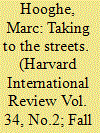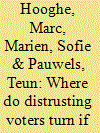|
|
|
Sort Order |
|
|
|
Items / Page
|
|
|
|
|
|
|
| Srl | Item |
| 1 |
ID:
099834


|
|
|
|
|
| Publication |
2010.
|
| Summary/Abstract |
The traditional distinction between civic and ethnic citizenship continues to dominate the study of citizenship concepts. In recent years, various authors have questioned the dichotomous character of these concepts. In this article, we empirically investigate the applicability of this dichotomy based on an analysis of International Social Survey Programme (ISSP) survey data across thirty-three societies. The analysis demonstrates that this dichotomous structure can indeed be detected and therefore the theoretical dichotomy can be considered as empirically valid. While ethnic citizenship refers most strongly to having national ancestry, for civic citizenship the most important criterion seems to be to obey national laws. However, the ethnic concept of citizenship can also be defined in a negative manner: for ethnic citizenship, obeying the national laws is clearly not a sufficient condition. Further analysis also reveals that the measurement of both concepts is not equivalent cross-nationally, so that findings on civic and ethnic citizenship are difficult to compare across societies.
|
|
|
|
|
|
|
|
|
|
|
|
|
|
|
|
| 2 |
ID:
102576


|
|
|
|
|
| Publication |
2011.
|
| Summary/Abstract |
Scholars have repeatedly expressed concern about the consequences low levels of political trust might have for the stability of democratic political systems. Empirical support and the identification of causal mechanisms for this concern, however, are often lacking. In this article, the relation between political trust and law-abiding attitudes is investigated. It is expected that citizens with low levels of trust in the institutions of the political system will find it more acceptable to break the law. As a result, low levels of political trust might undermine the effectiveness and legitimacy of government action and its ability to implement legislation. Based on survey data from 33 European countries using the 1999-2001 European Values Study (N = 41,125), the relation between political trust and legal permissiveness is examined using a multilevel ordered logistic regression analysis. The results show that respondents with low levels of political trust are significantly more likely to accept illegal behaviour such as tax fraud than respondents with high levels of political trust. Since it is known from earlier research that actors who are permissive towards law-breaking behaviour are more likely to commit these acts themselves, the hypothesis that low levels of political trust will be associated with less law compliance within a society is supported.
|
|
|
|
|
|
|
|
|
|
|
|
|
|
|
|
| 3 |
ID:
160322


|
|
|
|
|
| Summary/Abstract |
The campaign leading to the 2016 US presidential election included a number of unconventional forms of campaign rhetoric. In earlier analyses, it was claimed that the Trump victory could be seen as a form of protest voting. This article analyzes the determinants of voters’ choices to investigate the validity of this claim. Based on a sample of the 2016 Cooperative Congressional Election Survey, our analyses suggest that a Trump vote cannot be explained by a lack of trust in politics or low levels of satisfaction with democracy, as would be assumed given the extant literature on protest voting. However, indicators of racist resentment and anti-immigrant sentiments proved to be important determinants of a Trump vote—even when controlling for more traditional vote-choice determinants. Despite ongoing discussion about the empirical validity of racist resentment and anti-immigrant sentiments, both concepts proved to be roughly equally powerful in explaining a Trump vote.
|
|
|
|
|
|
|
|
|
|
|
|
|
|
|
|
| 4 |
ID:
083262


|
|
|
|
|
| Publication |
2008.
|
| Summary/Abstract |
Abstract. Pre-electoral coalitions (PECs) are one of the most often used methods to coordinate entry into the electoral market. Party elites, however, do not know how voters will respond to the coalition formation at the polls. In this article, the authors report on an experimental study among 1,255 Belgian students. In order to study voter responses to the formation of PECs, respondents were presented with two ballots: one with individual parties (party vote condition) and one with coalitions (coalition vote condition). The aim of this experiment is to predict under what conditions party supporters will follow their initially preferred party into the coalition and vote for the PEC, and under what conditions they would desert the PEC at the polls. The decision whether to follow the coalition or not can be traced back to four considerations: dislike of the coalition partner; ideological congruence between coalition partners; size of the initially preferred party; and being attracted to a specific high-profile candidate. (Dis)liking the coalition partner is independent from the ideological congruence between the two coalition partners. The study's results also show support for an adjustment effect, as respondents became more loyal toward cartels over the course of the 2003-2005 observation period.
|
|
|
|
|
|
|
|
|
|
|
|
|
|
|
|
| 5 |
ID:
119902


|
|
|
|
|
| Publication |
2012.
|
| Summary/Abstract |
Since 2011, various European countries have experienced periods of intensive political turmoil, with mass demonstrations that have sometimes turned violent. The high level of mobilization contradicts the often-expressed idea that young generations are no longer interested in politics, but hit the hardest by the economic downturn, the youth are most motivated to mobilize themselves.
|
|
|
|
|
|
|
|
|
|
|
|
|
|
|
|
| 6 |
ID:
103387


|
|
|
|
|
| Publication |
2011.
|
| Summary/Abstract |
It has been suggested that political distrust is associated with lower levels of voter turnout and increased votes for challenger or populist parties. We investigate the relationship between political (dis)trust and electoral behaviour using the 2009 Belgian Election Study. Belgium presents an interesting case because compulsory voting (with an accompanying turnout rate of 90.4 per cent) compels distrusting voters to participate in elections. Nevertheless, distrusting voters are significantly more inclined to cast a blank or invalid vote. Second, distrust is positively associated with a preference for extreme right (Vlaams Belang) and populist (Lijst Dedecker) parties. Third, in party systems where there is no supply of viable challengers (i.e. the French-speaking region of Belgium), the effect of political trust on party preference is limited. We conclude that electoral effects of political distrust are determined by the electoral and party system and the supply of electoral protest.
|
|
|
|
|
|
|
|
|
|
|
|
|
|
|
|
|
|
|
|
|